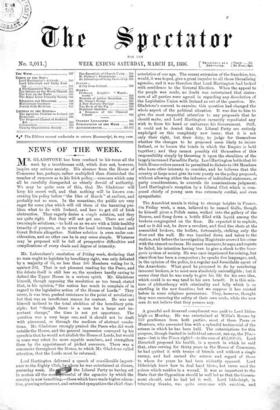Mr. Labouchere's resolution of Friday week, declaring that no man
ought to legislate by hereditary right, was only defeated by a majority of 36, no less than 166 Members voting for it, against 202. That is not pleasant reading for the Peers, and the debate itself is still less so, the speakers hardly caring to defend the Upper House in a serious spirit. Mr. Gladstone himself, though opposing the resolution as too broad, stated that, in his opinion, "the nation has much to complain of in regard to the legislative action of the House of Lords." They never, it was true, pushed resistance to the point of revolution ; but that was an insufficient reason for content. He was not himself inclined to the total abolition of the hereditary prin- ciple; but "though there is a case for a large and im- portant change," the time is not yet opportune. The question was a very large one, and it should not be dealt with piecemeal, or through the medium of abstract resolu- tions. Mr. Gladstone strongly praised the Peers who did work outside the House, and the general impression conveyed by his speech is that he would not abolish the House of Lords, but would in some way select its more capable members, and strengthen them by the appointment of picked assessors. There was a consensus throughout the House, to which Mr. Gladstone called attention, that the Lords must be reformed.






































